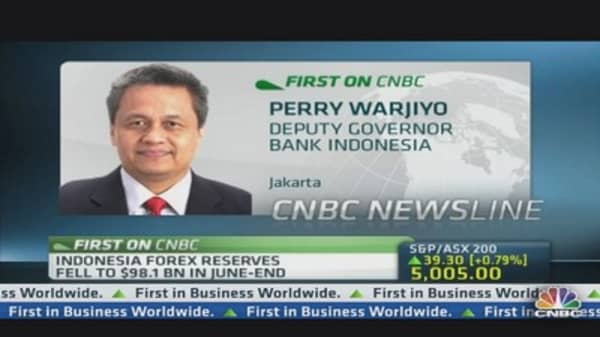Southeast Asia's largest economy Indonesia surprised with a rate hike twice the size of what the market expected, which its senior central banker says will bring capital back into the country and support its flagging currency.
Perry Warjiyo, deputy governor of Bank Indonesia, told CNBC that its 50 basis point interest rate hike on Thursday, which comes after a 25 basis point increase in June and takes the benchmark rate to 6.5 percent, was meant to send a bold message to the financial markets.
(Read More: We're Ready for Exit of QE Flows: Indonesia Official)
"We are committed to ensure stability and [rate hikes] will I think bring market confidence and that will also bring the capital inflows back to Indonesia and support the rupiah," Warjiyo told CNBC Asia's "Squawk Box" on Friday.
Indonesia's massive capital outflow in June of about $4 billion on speculation of the U.S. Federal Reserve tapering its stimulus program will reverse, Warjiyo added.
(Read More: Rate Hike a Pre-Emptive Strike: Indonesia Official)
Indonesia was the first Asian central bank to hike its policy rate since 2011 in mid-June, showing its commitment to stem the weakening of its currency. The rupiah, however, has continued to fall against the U.S. dollar, down almost 1.3 percent since mid-June to 9,980 - below the key 10,000 mark.
Indonesia has been scrambling to stop an outflow of foreign funds since May when the Fed signaled it was thinking about winding down its monthly $85 billion bond purchases, which has added extra liquidity to the country's financial markets.
Warjiyo said the central bank would continue to use "all instruments" of policy to prevent the capital outflows and depreciation of the rupiah.
"What we are trying to say is we will use all of the instruments, the interest rate, the exchange rate, the macro prudential measures," Warjiyo said.
(Read More: Asia's Fight to Stem Fund Outflows Just Starting)
The central bank, meanwhile, expects inflation to accelerate to 7.5 percent on an annual basis in July, compared to 5.9 percent in June as the full impact of fuel price hikes imposed last month hit consumers.
Increasing demand during the Muslim fasting month, which began this week, will also stoke inflation in the country with the world's largest Muslim population, Reuters reported.
(Read More: As Rupiah Declines, Indonesia Moves to Prevent Panic)
When asked if the latest interest rate hikes were enough to bring inflation to the comfort zone of 3.5-4.5 percent, Warjiyo said he continues to believe that inflationary pressures will be short-lived.
"I think we are already expecting that the peak in inflation in July will be dissipating in August and I think will go back to normal in September," Warjiyo said.
—By CNBC.com's Rajeshni Naidu-Ghelani; Follow her on Twitter @RajeshniNaidu




